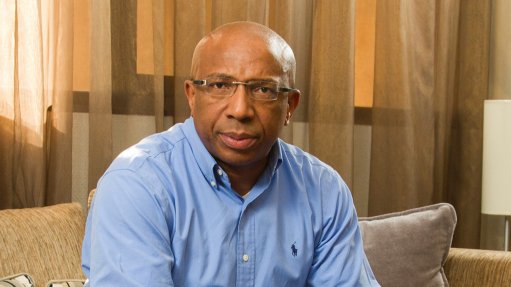
Telkom CEO Sipho Maseko
Telecommunications group Telkom has reported a 13.9% increase in headline earnings for the six months ended September 30, while earnings before interest, taxes, depreciation and amortisation rose 15.1% year-on-year to R5-billion.
CEO Sipho Maseko said the growth came on the back of Telkom’s multiyear cost efficiency programme.
During the period under review, Telkom continued with its efforts to transform the company and stabilise revenue. Operating revenue increased 5.5% year-on-year, spurred on by the continuing growth in the mobile business.
Mobile service and subscription revenue increased 41% year-on-year to R1.2-billion, including growth in mobile data revenue of 69% year-on-year to R711-million.
The group noted that competition had also increased substantially during the six months, while the economy had remained soft. Fixed-line usage continued to decline, with fixed voice revenue decreasing by about 3% year-on-year.
Data connectivity dropped by more than 5% year-on-year, to R3.3-billion, impacted by competitors’ self-provisioning of infrastructure and the intentional migration of customers from leased lines to next-generation service offerings.
Excluding revenue from leased lines, fixed data revenue is up more than 4%. Telkom also achieved good growth in the consumer business, with revenue from asymmetric digital subscriber line, or ADSL, growing in excess of 5% year-on-year. The number of subscribers also increased from 971 316 last year to 1.01-million this year.
“The challenges of intense competition, the soft economy and the evolutionary nature of the industry we find ourselves in will remain. As a result, the ongoing transformation of our business, from both a revenue and cost efficiency perspective, remains our key focus,” said Maseko.
Meanwhile, the company noted that it would invest at least R10-billion on its fibre-to-the-home programme Openserve, which sought to give one-million homes access to Telkom fibre, by 2018.
Capital expenditure for the six months rose by 20% year-on-year to R2.3-billion, owing to the expansion of Telkom’s mobile, fibre and long-term evolution networks.
Meanwhile, in the six months under review, Telkom had acquired Business Connexion Group for R2.7-billion, paid dividends of R1.3-billion and repaid its R1.16-billion maturing TL15 bond.
“Although challenges remain, we are confident that our turnaround strategy and other growth initiatives will deliver the results we have been working towards. We have a number of exciting ventures planned, which aim to make Telkom a very different business over the coming years,” Maseko highlighted.
LABOUR RELATIONS
As part of its cost-cutting programme, Telkom had downscaled its workforce. During the period, it approved voluntary severance and retirement packages for 3 108 employees and paid out R1.5-billion.
Speaking at the company’s results presentation on Monday, Maseko said cost-efficiency was a “never-ending journey”, comparing it to a marathon with “killer hills. The distance is short, but the effort is absolutely huge. Once we get through this, we will have a staff size that is manageable, fits the financial framework and takes us beyond our staff-to-revenue ratio goals”.
He believed the labour strategy had evolved but, as much as Telkom had made progress, there were still many headwinds.
He noted that earlier court proceedings had led to strain between Telkom and the trade unions that represented its employees. “We will fix it, permanently, so that we do not find ourselves in several stops and starts in terms of how we deal with our staff efficiency programme,” he said.
Also speaking at the results presentation, Telkom CFO Deon Fredericks said the group was, in the changed and challenging environment, working towards a new Telkom, although it hadn’t quite reached its goals.
He added that the short story of the results was that the company had been placed under a healthy growth trajectory and that it had derisked its mobile division, with a 90% reduction year-on-year.
“We will continue to experience pressure on our margins; this will not change, but we are producing good earnings and good cash. We are set on a path for sustainable growth,” he highlighted.